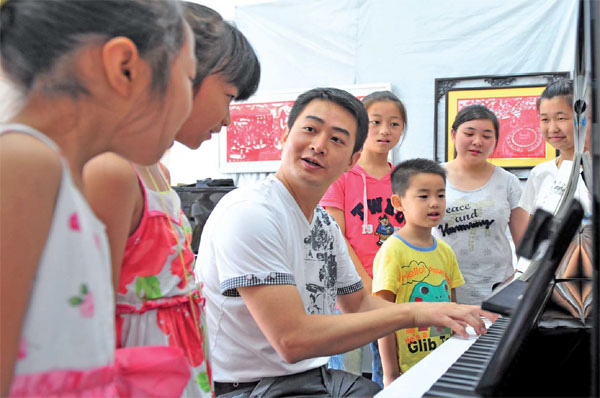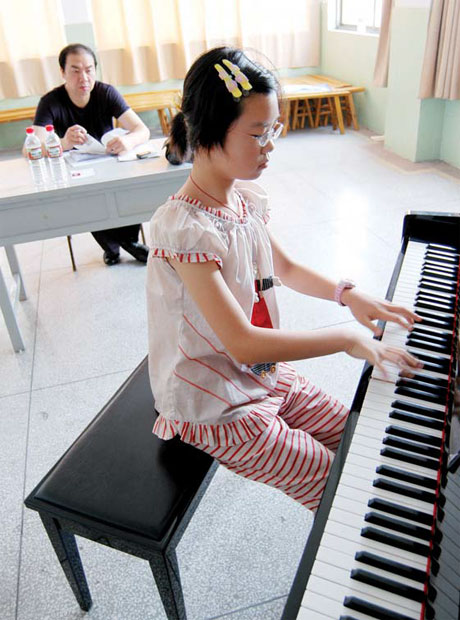Beyond the mechanics
Updated: 2014-12-05 08:47
By Yang Yang(China Daily Europe)
|
|||||||||||
Experts say too much focus on technique can kill any passion students have for piano
Qiu Chenyun, a 30-year-old marketing employee with a State-owned company in Suzhou, Jiangsu province, describes the days when she was learning to play the piano as "dark and miserable". "I had to practice three hours each day. It was so painful that I often set the clock ahead. I remember when I was practicing playing the piano, other children were watching cartoons on TV," she says.
Qiu's mother is a doctor and her father an engineer, and they wanted her to master a musical instrument
|
Young piano learners at the city's Youth Center in Yichang, Hubei province, watch the teacher play. Provided to China Daily |
"I learned piano for four years but it turned out that I have no talent," she says.
"A piano always reminds me of those days when I let my parents down, when they would lecture me about why I could not play well and then draw the conclusion that I would be a loser if I did everything in the same way that I learned piano. That is why I seldom tell people I learned the piano when I was little."
Qiu started to learn piano at the age of 7 in the early 1990s, when an increasing number of middle-class families in China started to pay more attention to nurturing such talent in their children. It was also in the early 1990s that the Central Conservatory of Music started to offer graded piano tests.
"There was a time when piano grade certificates could add points to children's scores for the enrollment examinations of some middle schools, and high schools, especially the top ones," says He Yi, 35, a piano teacher at the conservatory, who is also a judge of the tests.
So many children were encouraged or forced to learn the piano, not because they wanted to, but to get the certificates so they could go to better schools. Learning piano was thus a painful process for many children. There seemed no difference between piano and math, which Chinese children are famously good at.
"To pass the tests, some children would just practice the four piano works required for tests for a whole year," says Qiu. "How can children learn to enjoy music in that way?"
Although the Ministry of Education has since banned piano proficiency's use for school enrollment purposes, learning the piano is still regarded as a good way to help develop children's brains.
Some parents with great expectations for their children are determined to mold them into fine pieces of work. They regard a high level of accomplishment in playing the piano as one of the attributes necessary to achieve this goal.
"That is a reason why many parents want their children to learn piano, regardless of whether children like it or not," He says.
Little love for music
Over the last two decades, the enthusiasm of parents for their kids to learn the piano has never cooled. In fact, as China's economy has rapidly grown, more Chinese families have been able to afford musical instruments and music lessons for their children.
It is hard to know exactly how many Chinese children are learning the piano, but in September 2013, classical pianist Li Yundi said in an interview that the number might be between 40 million to 50 million, more than the population of Canada.
And in the summer of 2014, more than 8,000 young piano learners in Beijing alone signed up for piano level tests offered by the conservatory.
However, performing skills sometimes are emphasized far more than musical expression, and people blindly push their kids to higher and higher levels of proficiency.
Zhang Boyu, president of CCOM Press and former dean of the musicology department of the conservatory, compares piano learning in China to sports training.
"People have overemphasized the skills, overlooking music's cultural value," he says. "Yes, in the very beginning, proficiency tests can encourage or prompt children to learn a musical instrument, but essentially, there is no need to do those tests at all. Music is music."
"It's great that we have some excellent classical pianists such as Lang Lang, Li Yundi and Wang Yujia, who are internationally famous. But they do not represent the general level of musical culture in China," Zhang adds.
"Chinese people generally don't know how to appreciate piano music from the West, and they are even less interested in Chinese classical music such as the Kunqu Opera or in learning to play the guqin (a plucked seven-string Chinese musical instrument of the zither family)."
On a chilly Friday evening, the Forbidden City Concert Hall presented Ju Jin, a Chinese-born Italian pianist, but less than one-third of the 1,400 seats were occupied. Some people even fell asleep and a man was reading on his Kindle.
However, He Yi, from her professional perspective, says that Ju's performance was brilliant.
Zhang suggests that the chain of interests that has formed as the result of testing may have distorted the pleasure of music.
One afternoon when Ma Xia was 6, he came home from kindergarten and told his mother that he wanted to learn to play the piano.
"We then sent him to have lessons. It was his own choice. His father and I don't know much about the piano or music, we just think it will be helpful to develop his intelligence and nurture his ability to appreciate music," says his mother, Xia Qin, 33.
The boy, now aged 8, has passed the grade examination and the teacher of the training course says he might even be able to pass the grade 4 exam, but his mother says the boy's hands are not big enough to master the musical works that the level-four test requires.
"Some parents don't know how well their children can play. They often sign their children up for tests that they fail to pass," Qiu says.
The Central Conservatory of Music has more than 40 examination branches across the country. Each branch offers training courses and sells training materials.
Each year, thousands of children register for piano exams, with fees ranging from 50 yuan to 360 yuan($8; 6.5 euros to $59; 47 euros).
The Central Conservatory of Music Press has recently published a new set of piano training materials titled Piano Squirrels for beginners.
"But the training institutions may not want to use our materials because unlike existing teaching materials, we combine the study of the musical instrument with the study of music theory, so that they may not be able to give separate lessons, which means less profit," Zhang said.
"There is no need to separate the theory from playing. It will be less boring for children if the teachers can combine the two in one class. For instance, children can learn performance skills for some time and then teachers can teach them about the rhythm and how to sight-read," Zhang said.
The shortage of professional piano teachers is also a problem, Zhang added, saying unprofessional teachers destroy children's interest.
He Yi said when parents decide to let their children learn piano, they should pay more attention to choosing a professional teacher who has received their training at music conservatories.
When Qiu in Suzhou recalled her years learning the piano, the most memorable thing she recalls is the extramarital affair of her second piano teacher.
"We were good friends. He treated me like his daughter and told me everything. Usually we practiced for some time and he would let me stop for some food and drink," she said.
"But my first piano teacher was not so good at communicating with children. Her lessons were extremely boring," she said, "and she taught me for three years, and I completely lost interest in playing."
yangyang@chinadaily.com.cn
|
A young girl in Nanjing plays piano in the hope of getting a good grade from the judge behind. Provided to China Daily |
(China Daily European Weekly 12/05/2014 page24)
Today's Top News
US, Britain pledge to support Afghanistan
HK visit: A political kabuki
Ukraine unlikely to join NATO in near future
Hotpot chain to raise $129m
2014 likely to be record warmest year
Ukraine's ceasefire talks continue
China marks 1st Constitution Day
Outbound tourists hit record 100m
Hot Topics
Lunar probe , China growth forecasts, Emission rules get tougher, China seen through 'colored lens', International board,
Editor's Picks

|

|

|

|

|

|







